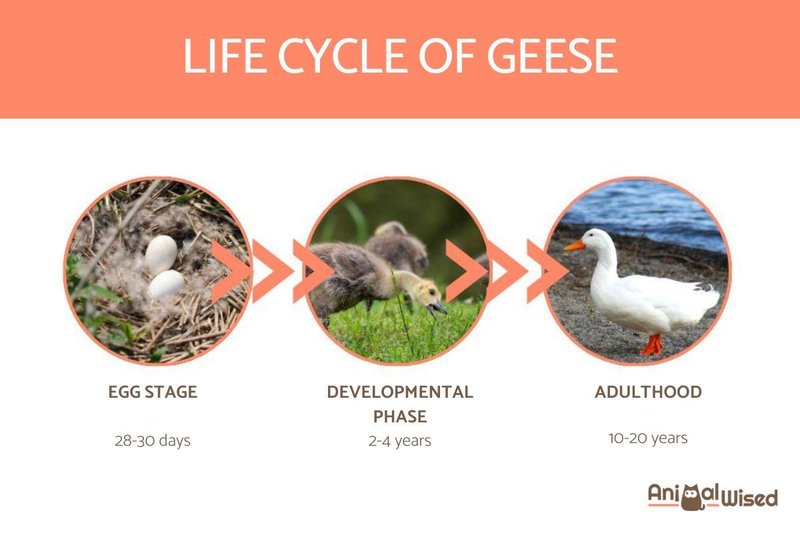
Understanding a goose’s lifespan isn’t just about numbers; it’s about their quality of life. Think of it this way: the lifespan of a goose in the wild is like that of a person living in a bustling city versus one in a cozy, friendly neighborhood. In the wild, geese face threats from predators, harsh weather, and food scarcity. In captivity, however, they’re often shielded from these dangers, which can lead to a much longer life. So, how long do geese actually live when they’re pampered?
The Average Lifespan of Geese
In general, the lifespan of geese can vary significantly depending on the species and their environment. Most domestic geese tend to live anywhere from 10 to 25 years in captivity. This is quite different from their wild counterparts, who usually only make it to around 10 years due to various dangers.
You might be wondering why there’s such a difference in lifespan. In captivity, geese are generally provided with regular food, clean water, and protection from predators. These factors drastically improve their life expectancy. For instance, a well-cared-for domestic goose can thrive much longer than its wild peers, all thanks to a cozy life away from danger.
Factors Affecting Goose Lifespan
Several factors play a role in determining how long geese can live. Here are a few key ones:
- Species: Different types of geese have varying lifespans. For example, the Embden goose can live up to 20 years, while the Chinese goose may only reach about 15.
- Diet: A balanced diet is crucial. Geese that are fed high-quality food tend to be healthier and live longer. Think of it as feeding your pet; the better the food, the better their health.
- Healthcare: Regular vet check-ups can prevent diseases that might cut their lives short. Just like people, geese need to stay on top of their health!
- Living Conditions: A safe, spacious environment allows geese to roam and exercise, which can lead to a happier and longer life.
By understanding these factors, you can take better care of geese and help them reach their maximum potential in terms of lifespan.
Wild vs. Captive Lifespan
So, how do the wild geese stack up against their captive relatives? Well, it’s a bit like comparing apples to oranges. Wild geese usually live around 10 years, although some may reach up to 15 years with favorable conditions. However, the harsh realities of nature—including predators and food scarcity—take a toll.
On the other hand, captive geese lead a life that tends to be much more predictable and safe. They don’t have to dodge predators or worry about finding food. Instead, they can focus on living their best lives, which often translates to much longer lifespans. While wild geese live for survival, captive geese live for comfort and companionship.
Common Breeds and Their Lifespans
When it comes to domestic geese, various breeds can vary in lifespan. Here are a few popular breeds along with their average lifespans:
| Goose Breed | Average Lifespan |
|---|---|
| Embden | 20 years |
| Chinese | 15 years |
| Pilgrim | 20 years |
| Buff | 10-15 years |
As you can see, some breeds are more resilient than others. If you’re planning on keeping geese, choosing a breed that suits your lifestyle and longevity expectations is essential.
How to Extend the Lifespan of Geese
Thinking about how to ensure your geese live a long and happy life? Here are some effective tips:
1. Provide a Balanced Diet: Think of this as the foundation to a healthy lifestyle. A mix of grains, vegetables, and high-quality feed can keep geese thriving.
2. Ensure Safe Housing: Make sure their living space is secure from predators and has enough room to roam. A spacious environment can lead to happier, healthier geese.
3. Routine Veterinary Care: Regular check-ups can catch problems before they become serious. It’s like a yearly physical for your feathered friends!
4. Social Interaction: Geese are social animals. Keeping them in pairs or small groups can reduce stress and improve their overall well-being.
By following these tips, you’re not just keeping your geese alive—you’re giving them the opportunity to truly thrive.
In summary, the lifespan of geese in captivity can be quite impressive, often ranging from 10 to 25 years depending on several factors. While wild geese face many perils, captive geese can lead longer, healthier lives when given the right care. Choosing the right breed, providing a balanced diet, ensuring safe housing, and maintaining regular veterinary care can all contribute to a longer life for your feathered friends.
So, whether you’re a current goose owner or thinking about becoming one, keep these insights in mind. With a little love and care, you can help your geese live their best lives for many years to come.

